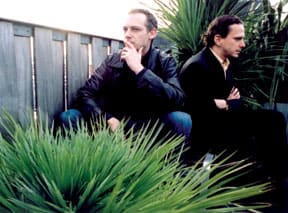Whether it's with partner Peter Kruder in Kruder & Dorfmeister or teamed up with Rupert Huber in Tosca, Richard Dorfmeister has quickly become one of the masters in the electronic music scene. But even while heads nod rhythmically to the duo's new recording, Dehli9, what they are hearing are not the scene's de rigeur sample manipulations. Dorfmeister and Huber piece together their cuts by playing, and then sampling, their own live instruments.
"We just love to play around with stuff, and because we're able to play all the instruments ourselves we don't need to bring in people very much," explains Dorfmeister. "That's quite a comfortable thing to do. It's a working method we've developed over the years and I think the way we record is unique. We don't have to worry about [sample] acknowledgment and we don't have to panic if something's not working out. We can just stop and continue on the next day."
It might appear that Tosca is coming down on one side or the other on the debate regarding the legitimacy of sampling versus live playing, but Dorfmeister demurs. "People are able to create entirely with samples, and that's fair enough," he says. "I'm sort of against the discussion that if something's played [with live instruments] then it's better. If you're able to generate a track with only samples which is more difficult than playing instruments then you're lucky. But for us it's just much more free to play because you keep all the doors open and modulate much more easily."
"We just love to play around with stuff, and because we're able to play all the instruments ourselves we don't need to bring in people very much," explains Dorfmeister. "That's quite a comfortable thing to do. It's a working method we've developed over the years and I think the way we record is unique. We don't have to worry about [sample] acknowledgment and we don't have to panic if something's not working out. We can just stop and continue on the next day."
It might appear that Tosca is coming down on one side or the other on the debate regarding the legitimacy of sampling versus live playing, but Dorfmeister demurs. "People are able to create entirely with samples, and that's fair enough," he says. "I'm sort of against the discussion that if something's played [with live instruments] then it's better. If you're able to generate a track with only samples which is more difficult than playing instruments then you're lucky. But for us it's just much more free to play because you keep all the doors open and modulate much more easily."
